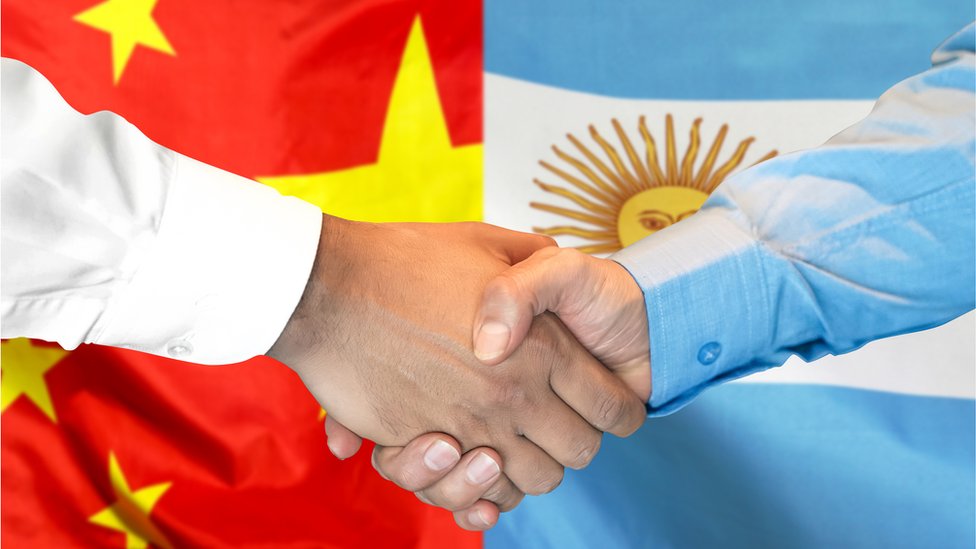RIO DE JANEIRO, BRAZIL – Amid a climate of financial uncertainty and with the reserves of the Argentine Central Bank (BCRA) at the limit, Argentina is negotiating with China an extension of swaps to swell the national funds and eventually use this draft for debt payment in the face of a complicated scenario.
According to El Cronista, qualified sources in the Casa Rosada revealed that the head of the BCRA, Miguel Pesce, has already received the approval of President Alberto Fernández to move forward in negotiations with China to extend swaps in an agreement with the People’s Bank of China, which Xi Jinping’s government manages.
It is not an easy negotiation. Since the beginning of the year, the yuan’s devaluation against the dollar has already subtracted more than US$1.1 billion from the BCRA reserves. It is taking place in a context of high vulnerability for the BCRA amid political uncertainty.

Although the amounts of the swaps extension negotiated by Pesce with China were not detailed, it is known that up to last March, Argentina accounted for CNY 130 billion (US$19 billion) among its gross reserves. According to information from the Government and Chinese diplomacy, there could be an increase of another CNY 20 billion.
The issue is being handled directly by Pesce. Not even Chancellor Santiago Cafiero or the Argentine Ambassador in Beijing, Sabino Vaca Narvaja, intervened in the negotiations of the last weeks between the BCRA and the People’s Bank of China.
At the same time, Casa Rosada said that the details of the negotiation of the extension and use of China’s swaps “are in the technical agreement stage”. There is also speculation that this funds transfer to the reserves may be used to pay the debt without activating the Shibor rate.
The fact is that the Shibor rate imposed by China in the case of using swaps as part of liquid reserves is very high. It is even more expensive than a common credit for investments. For this reason, Pesce would be inclined to maintain a “balance” between using reserves, Shibor rate accounting, and stable reserves, according to the sources consulted.
Currently, the BCRA’s reserves are at their limit. According to private estimates, net reserves are barely over US$1.5 billion, and this negotiation with China would help strengthen them.
It is estimated that the latest agreement between the People’s Bank of China and the Central Bank will allow Argentina to include some CNY 130 billion (US$19 billion) in its reserves, which, in principle, will increase the gross reserves.
BRICS AND OTHER AID
In parallel, President Alberto Fernández will participate this Friday in the XIV BRICS Summit to be held online under the slogan “Fostering a Global Partnership for Development in the New Era to implement the 2030 Agenda for Sustainable Development jointly”.
Argentina aspires to join this group of emerging countries formed by China, Russia, India, South Africa, and Brazil. But this is not a simple procedure since the entry of a new country into this group requires the consensus of all partners.
At Friday’s summit, the central themes of the forum will be: Multilateralism and Global governance, Focus on Development and Technology Transfer, Mutually beneficial cooperation, Innovation, and New Industrial Revolution focused on productivity, Harmony with the environment, Concrete results-oriented proposals, Health Cooperation, Contributions to Poverty Reduction, Financial architecture based on productive development, Enhancing the digital economy and connectivity.
This year, China has the rotating presidency of the BRICS and is actively promoting the addition of more countries to the initiative.
Alberto Fernández’s participation in this summit is significant since this geopolitical group has been playing a central role in promoting a new international financial architecture.
In this sense, the creation of the New Development Bank of the BRICS (NDB) together with the Agreement on Reserves of Continencias (ARC) are “key” instruments for the World Macroeconomic Stability.
“They are key instruments to consolidate a new productivity-oriented financial architecture and promote a new multipolar world order,” the government said in assessing the importance of the BRICS summit.
The NDB is vital to shore up the infrastructure deficits of emerging countries. The core objective is to finance infrastructure and sustainable development projects. Its projected program for 2022-2026 contemplates financial assistance for member countries of US$30 billion.
At the same time, the ARC was created to strengthen the global financial protection network. Its objective is to prevent liquidity crises or to contain market volatility in the face of the withdrawal of monetary stimuli. It currently operates as a currency swap agreement for some US$100 billion.
With information from El Cronista

